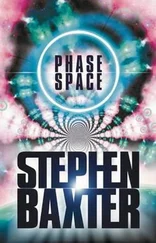1 ...6 7 8 10 11 12 ...26 To Greenberg, they looked like nothing so much as seals.
It was their choice, or their progenitors anyhow. But what Greenberg couldn’t figure was what they did all day.
Greenberg himself still had work to do, in these rare intervals of wakefulness: monitoring Ra’s external systems, checking the import of volatile and metal-rich cargoes.
But maybe the Weissmans were just being kind. There were probably gigantic smart systems that backed up every action he took. He was a kind of museum piece, he supposed: the first human to rendezvous with an asteroid, all those years ago, a living totem for the Weissmans of Ra.
He finished the soup and let go of the packet, and a domestic bot – a fussy little bastard like a trash can with attitude thrusters – came hissing out of its corner and grabbed the bag.
Greenberg felt sour, grumpy and isolated.
He studied Earth, which swam past on one of its closest approaches to the rock in years.
He remembered from his first orbital missions aboard Shuttle, all those centuries ago, how the coastal rims of the continents would just glow with artificial light. Greenberg had supposed, then, that it would go on, that the Earth would just get richer and fatter and brighter.
But it hadn’t worked out that way. Earth, in fact, grew darker every time he looked.
Once the expansion into the near-Earth rocks had begun, it wasn’t long before a move further out followed: first to Phobos and Deimos, the captured asteroids that circled Mars, and then out into the main belt itself. Vesta, one of the biggest of the main belt rocks, had been the first to be extensively colonized, and now it was the hub of further expansion, little archipelagos of busy mines and colonization, scattered across the belt.
And, so Greenberg understood, there were some pioneers who had gone even farther afield: to the comets out in the Oort Cloud, and the Kuiper Belt, where billions of ice moons the size of Ganymede swam through the darkness.
Of course the techniques they used nowadays made Ra look primitive. Those universal fabricators, for instance, that sucked in asteroid ore at one end and pumped out whatever you wanted at the other, using something called molecular-beam epitaxy to spray atoms and molecules directly onto a substrate. Greenberg didn’t understand any of these new gadgets, even the stuff you could see.
It was strange for Greenberg to remember now how much agonizing there had been when he was growing up about the depletion of Earth’s resources, the need to close the loops of mass and energy, as if Earth itself was one big CELSS. Nobody worried about that any more; the solar system had worked out to be just too rich in resources; those loops would stay open for a long time yet.
It took a long time for the economics and demographics and such to work out, but it had all been pretty much inevitable, it seemed to Greenberg. It was just so much cheaper to send resources skimming between the rocks than to haul them out of the planets’ big gravity wells. The colonies on Mars and the Moon had shrivelled and died, and Earth – growing poorer, its population steadily declining – had turned into a kind of huge theme park: a museum of the human species, but studded with pits of abject poverty, in the darkened ruins of the old cities. Nobody knew what was happening in those pits.
And nobody much cared, because beyond old Earth there were too many people even to count.
If you knew where to look, the sky was full of inhabited rocks, with their little orbital necklaces of solar power stations, and habitats studding their surfaces or buried inside, green and blue, the old colours of life. It was estimated that for every person alive when Greenberg was born, there were a billion human souls now. That was a hell of a thought. And when he considered some of the assholes he used to have to work with back in those days, a dismaying one.
In Ra there was a whole bunch of little Weissmans, though not all of them used Mike’s old name any more, and so in his head Greenberg thought of them all as Weissmans; it made it easier to love them. Mike would have been pleased, anyhow. There were no Greenbergs, though. His line had finished with a great-grandchild, a male, who had got caught up in the New AIDS epidemic of the twenty-second century, and died childless. It was ironic. Here was Greenberg, perhaps the oldest surviving human, and not one of all those teeming trillions floating around the system could claim direct descent from him.
On the other hand, by the laws of statistics, there ought to be a billion Einsteins out there. Nobody knew what they were all doing. They sure weren’t working together.
All those pious dreams of the space buffs of some kind of giant solar-system civilization had never been remotely likely. There were just too many people. The human race had gathered into a billion small-town-sized tribes and splintered, shaping and seeking goals unimaginable to an Earth-born geezer like him.
It seemed to him, in fact, that he was watching the end of the species, as a unitary whole: two million years out of Africa, the race had escaped from the cradle and was growing, to where the hell nobody could even guess.
… And now here came Toutatis on its aerobraking pass.
The rock looked like a comet glowing in the thin upper air of Earth, streaking by in a perfect straight line below Greenberg. It made the cities and oceans of Earth glow like the day – it must have been a remarkable sight from down there – and asteroid light played on his own face, the ancient bones of his eye sockets.
The encounter was over in seconds. The trail of scorched air soon dissipated and dimmed, and Toutatis, its orbit subtly altered, passed on towards its next encounter. It was going to take fifty years to nudge Toutatis into its final low Earth orbit, but planning projects on that kind of time scale didn’t seem to trouble the inhabitants of Toutatis, or anybody else.
The show was over. The people of Ra-Shalom drifted away from their blue watery windows, and returned to their mysterious business within.
Greenberg had never meant to live for a thousand years. It was ridiculous. Nobody else had stuck around like this. It was just that he would have had to have chosen when to die, and that was something he had never expected to face when he grew up, and he just had no instinct for it.
Anyhow, if he let himself die, he would have missed this.
Greenberg, with a sigh, turned away from the window and went to his instrument consoles.
It was a massive asteroid, big enough to have dragged itself into a sphere, with planet-like layers of internal structure, rich in metals, rocks and volatiles. It was bathed by the light of a sun only three times as far away as from Earth.
The guardians considered carefully. It was, after all, to be the repository of all that was left of their designers’ species, until even this new young sun guttered and died.
They were machines designed to plan for billions of years. They had already nursed their fragile cargo across such deserts of time. Now, looking to the future, they must plan for evolution, even the loss of mind.
It was a good home, rich in energy and resources.
The guardians were satisfied. They closed themselves down.
Within the rock, history continued.
It was to be quite a day, as the last of Ra’s ore was transmuted, and Greenberg made sure the Weissmans woke him up to see it. In the event he nearly missed it, it took so long to put him together again.
Greenberg’s window was the same old tunnel through fused regolith, but the view beyond changed as he watched, the last of the grey-black old crap literally dissolving before his eyes, to be replaced by a sharp, tight blue curve of watery horizon.
Читать дальше












